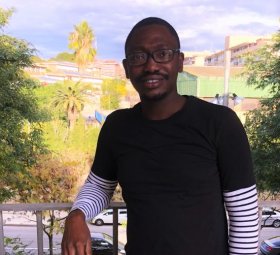Regan Ceaser


PhD Programme: Nanoscience, Materials and Chemical Engineering
Research group: MEtA – Materials Engineering and their Applications
Supervisors: Francesc Medina Cabello, Magdalena Constantí Garriga & Daniel Montané Calaf
Bio
Regan Ceaser received his bachelor's degree in chemical engineering at the Kwame Nkrumah University of Science and Technology, Ghana, in 2014. During his bachelor studies, he undertook two research projects: “Production of wood plastic composites from saw dust and polyethylene terephthalate” and “Production of bioethanol from maize stover using simultaneous saccharification and fermentation”. He later worked in the same university as a research and teaching assistant. His passion for research pertaining to ways to transform biomass into useful applicable products led him to securing a master's degree program in Chemical engineering at the Stellenbosch University under the National Research Foundation, Department of Science and Innovation and The Council for Scientific and Industrial Research (CSIR) – Waste RoadMap, in South Africa. The research was aimed at fractionating and obtaining high quality and value-added products from agricultural waste whiles simultaneously producing nanocellulose that can be used in making biofilm materials to replace plastics. He doubled as a teaching and research assistant for undergraduates and final year bachelor project students, respectively during his master's studies. With a tenacious and fervent interest in the current biomass transformation methods into value-added products he joined the Universitat Rovira i Virgili, Spain as a PhD researcher working under Francesc Medina Cabello within the Martí i Franquès COFUND Programme.
Project: Valorisation of hydrolysate from lignocellulosic biomass through catalytic and biological processes combined
The main objective of this project is to design and validate a process for the valorisation of hydrolysis products from non-food lignocellulosic biomass to high added-value chemical products. This solid non-food biomass includes forest residues, agricultural residues or waste from paper production. In the finalizing project, the lignocellulosic material has been fractionated with ionic liquids or along autohydrolysis using different types of catalysts and microwave reactors. Subsequently, from the microwave-assisted hydrolysis of cellulose and hemicellulose, "Platform chemicals" have been obtained, among which glucose and xylose have been fermented microbiologically to lactic acid. In this proposed project, we aim to deepen in the valorisation of the remaining hydrolysis products, in order to reduce the amount of waste generated, which strengthens the circular economy, a concerning trait in today's society. Thus, catalytic and biological reactions will be used to obtain products with high added-value for the industry. In this sense, we have shown that as a products of hydrolysis of cellulose and hemicellulose, in addition to glucose and xylose, levulinic acid, furfural, HMF and formic acid are generated. In the new project, hydrogenation reactions, aldol condensation and a new metathesis path are proposed to obtain high added-value products such as diols, C8-C13 alkanes for fuels, adipic acid (nylon), etc. All of them of great importance for the industry. Alternatively, the levulinic acid will be converted to a PHA copolymer by bacteria. The HMF will be transformed by photocatalytic processes to FDCA (plastic). On the other hand, in the hydrolysis of hemicellulose, xylose and furfural are obtained mainly. In this case, the xylose will be bacterially treated for the synthesis of plastic PHB and furfural enzymatically for the production of furoic acid (important in the food industry and nylon).
Open Access publications
- Regan Ceaser, Silvia Rosa, Daniel Montané, Magda Constantí, Francesc Medina. Optimization of softwood pretreatment by microwave-assisted deep eutectic solvents at high solids loading, Bioresource Technology, Volume 369, 2023, 128470. View ful-text
Outreach activities
- European Researchers' Night 2023. European Corner: "Transformation of softwood mixture into hydrogen by catalytic and biological processes".
Awards & Prizes
-
2nd prize in the “2nd year students” category, of the 17th Doctoral Day of the Doctoral Programme in Nanoscience, Materials and Chemical Engineering.



